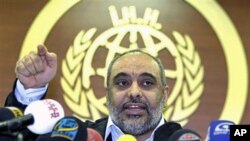Last May, Israeli forces killed nine Turkish citizens trying to break the Israeli sea blockade of the Gaza strip. The killings resulted in relations hitting rock bottom between these former close allies. Now a new crisis is looming. With the anniversary of the deaths approaching, another attempt is being planned to break Israel's blockade.
Last year's killings saw nationwide protests in Turkey. The nine Turkish citizens were killed on the Turkish ship the "Mavi Marmara," which was part of a flotilla of ships seeking to break Israel's economic blockade of the Gaza strip. One year later, the main organizers of last year's voyage, the Turkish-based Foundation for Human Rights, Freedoms and Humanitarian Relief, or IHH, is preparing a new blockade-busting voyage.
The Leader of the IHH is Bulent Yildirim, who said they are getting the flotilla ready and that there will be a ship from every country in Europe. Yildirim said the "Mavi Marmara" from Turkey will be part of it, and until the blockade is lifted on Gaza, the intifada will continue by land, by sea and by air.
Cooled relations
Last year's killing of Turkish citizens by Israeli forces, who maintain they were acting in self defense, saw relations between Israel and Turkey - former close allies - reach a crisis point. Almost 12 months later, there has been little improvement, with the Turkish government demanding compensation for the victims and apologies, something Israel refuses to do.
The prospect of a new flotilla caused Israeli ambassador Gaby Levy to call on the Turkish government to stop it. Senior Turkish diplomat Selim Yenel said there is little they can do.
"Its not a government act, we are doing our best to avoid any kind of tension," said Yenel. "In the end it's an NGO (non governmental agency). As we could not prevent the first one, I don't think we can prevent the second one either. So we will, of course, if the flotilla sets sail, we will again be asking them to be prudent, but I think prudence is something Israelis should have to do much more."
Political Islamic ties
Istanbul University professor Nuray Mert said the Turkish government, however, can intervene by claiming there are close links between the Islamic-rooted charity organizing the flotilla and the ruling Turkish AK party, which also has its roots in political Islam. Mert warns that if the new flotilla sails, it will set back any chance of an improvement in Turkish-Israeli ties.
"Any chance of rapprochement, any level of rapprochement will be postponed," said Mert. "We will all know that the government has close links with the those people who were in the first flotilla and preparing for the next one, apparently. They are very close to the government, so of course the government can stop the effort."
Avoiding conflict?
Taking a tough stance against Israel plays well, though, with much of the Turkish electorate, especially among much of the ruling AK party's grass root supporters. That's according to political columnist of the Turkish daily Haberturk, Soli Ozel. He said that's an important consideration with an election coming up this June.
"Well, right before the election, the Turkish government is not going to do anything that will look as if they are caving into the Israelis," said Ozel. "But I hope it goes without a major incident and suppose both sides are going to be slightly wiser."
Observers warn that with Syria in turmoil, the last thing the region needs is a new crisis. But with the flotilla due to leave in the coming weeks, a new crisis could well be looming.
Turkish Group Planning New Attempt to Break Israel's Blockade of Gaza
- By Dorian Jones




